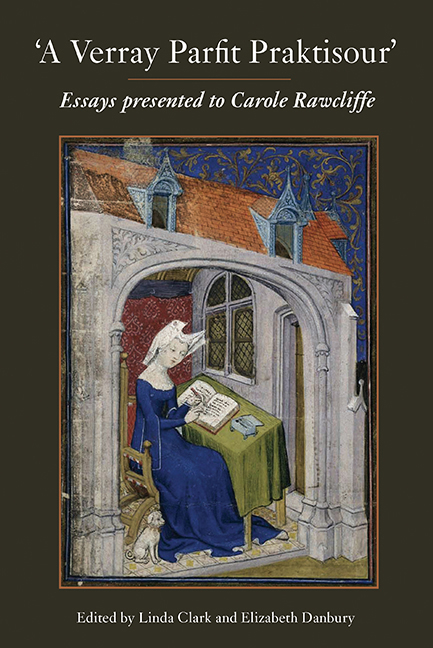Book contents
- Frontmatter
- Contents
- List of Illustrations
- List of Contributors
- Acknowledgements
- Abbreviations
- Tributes
- 1 Coslania, Norwich: an Archaeological Contribution to Early Medieval Urban History
- 2 A Queen in Rebel London, 1215–17
- 3 Defensive Officials and Defensive Levies in Fourteenth-Century Muster Rolls: an East Anglian Perspective
- 4 Lettice Oo? Queen Isabella's Accidental Apothecary
- 5 The First Instrument of Medicine: Diet and Regimens of Health in Late Medieval England
- 6 Politics and Piety: Norwich City Churches, Commemoration and Networking for the Afterlife
- 7 Telling the Time in Chaucer's London
- 8 The Bankrupt Bibliophile, William Paston, 2nd Earl of Yarmouth (1654–1732)
- 9 Ottomans, Neo-Ottomans and Invented Tradition in Hospital Music Therapy
- The Published Works of Carole Rawcliffe, 1976–2016
- Index
- Tabula Gratulatoria
5 - The First Instrument of Medicine: Diet and Regimens of Health in Late Medieval England
Published online by Cambridge University Press: 09 May 2017
- Frontmatter
- Contents
- List of Illustrations
- List of Contributors
- Acknowledgements
- Abbreviations
- Tributes
- 1 Coslania, Norwich: an Archaeological Contribution to Early Medieval Urban History
- 2 A Queen in Rebel London, 1215–17
- 3 Defensive Officials and Defensive Levies in Fourteenth-Century Muster Rolls: an East Anglian Perspective
- 4 Lettice Oo? Queen Isabella's Accidental Apothecary
- 5 The First Instrument of Medicine: Diet and Regimens of Health in Late Medieval England
- 6 Politics and Piety: Norwich City Churches, Commemoration and Networking for the Afterlife
- 7 Telling the Time in Chaucer's London
- 8 The Bankrupt Bibliophile, William Paston, 2nd Earl of Yarmouth (1654–1732)
- 9 Ottomans, Neo-Ottomans and Invented Tradition in Hospital Music Therapy
- The Published Works of Carole Rawcliffe, 1976–2016
- Index
- Tabula Gratulatoria
Summary
yll diete (as me thynketh) is chief cause of all dangerous and intolerable diseases: and of the shortenes of mans life. Than hit must nedes folowe that a te[m]perate and moderate diet pronlongeth [prolongs] mans life; and saueth [saves] hym from all suche peynfull diseases.
In the opening page of his book on health Thomas Paynell, a sixteenth-century translator who enjoyed the patronage of some of the great nobles of his time, expressed concern that his contemporaries died younger than ‘me[n] in tyme past’. The famous physician Galen (d.c. AD 203) had, he claimed, lived for a remarkable 140 years. The first reason for this ‘stra[n]ge alteration’ was that men and women were not fulfilling the commandments of God; the second cause was ‘surfet and diuersites of meates and drynkes’. His explanation was neither new nor original; medical authorities repeated ad nauseam the Galenic maxim that diet was the first instrument of medicine. Constant repetition was demonstrably no guarantee that theory would be put into practice. This apparent indifference to medical opinion does not mean, however, that medieval English men and women remained ignorant of the dangers of excessive eating and drinking. Faced with plague, famine and disease, they sought reliable advice about good health, first in manuscript and, increasingly after 1476, in print.
Until recently, medical historians have understandably focused their interest upon members of a court elite who could afford medical advice customised to their personal needs. The extent to which other classes of English society, such as artisans, affluent merchants and even farm labourers, appreciated the importance of a good diet has hitherto attracted less attention. In 1998 Faye Getz included a chapter entitled ‘Well-Being without Doctors’ in her Medicine in the English Middle Ages. She suggested that medieval English people did not have to be rich in order to gain access to medical care, and that even those who could afford trained physicians sometimes avoided them by choice. What is more, those of superior social status, as well as the lowlier recipients of their Christian charity, shared similar notions about health. It is less clear, however, what level of understanding the latter attained, or by what means medical ideas were disseminated. There remains a pressing need to investigate the connection which was clearly perceived to exist between the physical and spiritual welfare of all classes.
- Type
- Chapter
- Information
- A Verray Parfit PraktisourEssays presented to Carole Rawcliffe, pp. 99 - 120Publisher: Boydell & BrewerPrint publication year: 2017

